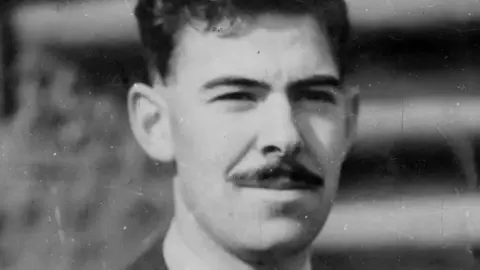John Cruickshank, the last surviving recipient of the Victoria Cross from World War II, has passed away at the remarkable age of 105. The flight lieutenant, who hailed from Aberdeen, secured this prestigious military honor for his audacious actions during an aerial assault on a German U-boat while piloting a Catalina flying boat in June of 1944. His death marks a poignant moment in history, as he was the last among the 181 brave soldiers who were awarded the Victoria Cross for their remarkable valor throughout the conflict.
The family of Flt Lt Cruickshank shared that he died last week, revealing plans for a private funeral in his memory. Born in 1920, he witnessed and participated in significant events during a turbulent period of global history. His actions during the war have not only earned him accolades but have also left an indelible mark on the collective memory of Britain and the Commonwealth.
On June 17, 1944, Cruickshank embarked on an operation intended to secure British vessels in the strategically important Norwegian Sea. During a fierce confrontation, he sustained life-threatening injuries numbering 72 in total. These injuries included critical wounds to his lungs as well as multiple injuries to his lower limbs. Despite suffering such devastating physical trauma, he exhibited extreme bravery, refusing immediate medical attention and choosing instead to pilot his damaged aircraft back to its base at Sullom Voe in Shetland, demonstrating an unwavering commitment to his crew and mission.
The saga of this courageous mission began when Cruickshank and his crew spotted a German U-boat. Under intense enemy fire, they initiated their attack. However, the bombs did not deploy as intended, necessitating a second run at the target. On this second attempt, Flt Lt Cruickshank personally released the bombs, successfully destroying the submarine, an act that defined his heroic legacy. While the operation came at a heavy cost—his navigator, John Dickson, was killed, and several crew members were injured—it solidified his status as a national hero.
His bravery did not go unrecognized; on August 29, 1944, King George VI awarded Flt Lt Cruickshank the Victoria Cross, commending his “determination, fortitude and devotion to duty.” In a rare moment of vulnerability, Cruickshank once remarked in 2008, “You don’t get involved in that kind of thing thinking of any decorations or any recognition. It was regarded as duty.” This sentiment reflects the often humble nature of those who serve, prioritizing their commitment to country over personal glory.
After army life, Cruickshank left the Royal Air Force in 1946 and pursued a career in banking. Yet, he retained the threads of his past, connecting to his war history, especially as he was given the chance to fly in a similar aircraft to the one he piloted during the conflict in 2013.
In acknowledgment of his milestones and contributions, a Catalina flying boat was flown over his home in Aberdeen to celebrate his 104th birthday last year, a fitting tribute to a man who exemplified the qualities of a true hero. As news of his passing spreads, the legacy of Flt Lt John Cruickshank will remind generations of the sacrifice and courage displayed by those who served in World War II and will resonate through the history of the United Kingdom and its armed forces.












